Portugal in the Eurovision Song Contest
Portugal has participated in the Eurovision Song Contest 51 times since its debut at the 1964 contest. Since then it has missed five contests (1970, 2000, 2002, 2013 and 2016). The contest is broadcast in Portugal by Rádio e Televisão de Portugal (RTP). Portugal won the contest for the first time in 2017 and hosted the 2018 contest in Lisbon.
| Portugal | |
|---|---|

| |
| Member station | RTP |
| National selection events | National final
Internal selection
|
| Participation summary | |
| Appearances | 51 (42 finals) |
| First appearance | 1964 |
| Best result | 1st: 2017 |
| Nul points | 1964, 1997 |
| External links | |
| RTP page | |
| Portugal's page at Eurovision.tv | |
Portugal in the Eurovision Song Contest 2021 | |
Portugal finished last on its debut in 1964 and again in 1974, before achieving its best result of the 20th century in 1996, with Lúcia Moniz finishing sixth. The country then finished last for the third time in 1997. Having not appeared in the final since 2010 and as holders of the record for most appearances in the contest without a win, Portugal won at the 49th attempt, when Salvador Sobral won the 2017 contest with the song "Amar Pelos Dois", Portugal's first top five result in the contest. As hosts in 2018, the country finished last in the contest for the fourth time. In 2019, the country failed to qualify.
History
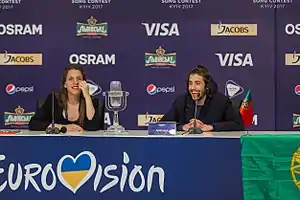
Portugal's debut entry was António Calvário with "Oração". It was not a successful debut for the country, with Calvário coming last in the contest. Since then, Portugal has come last on three further occasions, in 1974, when Paulo de Carvalho sang "E depois do adeus", in 1997, when Célia Lawson performed "Antes do adeus" and in 2018 as a host country. Despite its last-place finish in the contest, "E depois do adeus" gained notability for being used as the radio musical signal to begin the Carnation Revolution against the Estado Novo regime, being played at 22:55 on the 24th of April, 1974.[1] Prior to their sixth-place finish for Lúcia Moniz, with the song "O meu coração não tem cor" in 1996, Portugal's best result in the contest was two seventh-place finishes, for Carlos Mendes in 1972 and José Cid in 1980. Despite having some really weak results, the 90s were the most successful decade for the country, reaching the top 10 four times. Portugal had admission to take part in the 2000 and 2002 contest but refused. Its place was taken by Latvia both times, which ended up winning the contest in the latter year.
Since semi-finals were introduced in 2004, Portugal has failed to reach the final eight times, including from 2004 to 2007. In 2008, Vânia Fernandes finished 13th with the song "Senhora do Mar," Portugal's best outcome since 1996. The country continued to be present in the final until 2010. In 2017, Portugal reached the finals with Salvador Sobral's entry, "Amar pelos dois", ending a 6-year non-appearance in the finals, as it did not participate in the contest in 2013 and 2016 and did not qualify for the finals in 2011, 2012, 2014 and 2015, finally winning the contest for the first time ever, earning 758 points, setting the record for the highest number of points in the history of the competition, topping both the televoting and jury voting for the first time since Austria's "Rise Like a Phoenix" in 2014. It was the first winning song entirely performed in a country's native language since Serbia's "Molitva" in 2007. In 2018, as a host country, Portugal came last for the fourth time in the contest, and for the first time in a non-joint last position. This was the third instance of a host country placing in the bottom 5 since 2015.
Absences
Portugal has been absent from five contests since their first participation. The country's first absence was in 1970, where Portugal, along with four other countries, boycotted the contest due to the result of the previous year, when four countries were announced the winner.[2]
Portugal missed the 2000 contest due to their poor average results over the past five years. Despite being eligible to enter the 2002 contest, RTP declined to enter, and was replaced by eventual winner Latvia.[3]
The fourth absence was in 2013, when Portugal didn't participate for financial reasons.[4]
The fifth absence was in 2016.[5] RTP mentioned that this break was needed, so that the national selection for the Eurovision Song Contest had its contents renewed.[6]
Festival da Canção
Festival da Canção (sometimes referred to as "Festival RTP da Canção") is the Portuguese national selection for the Eurovision Song Contest, organized by RTP, and is normally held in February/March of the year of the contest. It is one of the longest-running Eurovision selection methods. Previously a number of regional juries selected the winner, however recently the winner has been selected through televoting. In 2009, 2010, 2017, 2018 and 2019 a 50-50 system between district juries and televote (like in the ESC) has been used.
In the years when Portugal does not participate in the contest, the Festival da Canção was not held, except in two occasions: in 1970, when Portugal boycotted the contest, and in 2000.
Contestants
1 |
Winner |
2 |
Second place |
◁ |
Last place |
X |
Entry selected but did not compete |
| Year | Artist | Language | Title | Conductor[7][lower-alpha 2] | Final | Points | Semi | Points |
|---|---|---|---|---|---|---|---|---|
| António Calvário | Portuguese | "Oração" | 13 ◁ | 0 | No semi-finals | |||
| Simone de Oliveira | Portuguese | "Sol de inverno" | Fernando de Carvalho | 13 | 1 | |||
| Madalena Iglésias | Portuguese | "Ele e ela" | Jorge Costa Pinto | 13 | 6 | |||
| Eduardo Nascimento | Portuguese | "O vento mudou" | Armando Tavares Belo | 12 | 3 | |||
| Carlos Mendes | Portuguese | "Verão" | Joaquim Luís Gomes | 11 | 5 | |||
| Simone de Oliveira | Portuguese | "Desfolhada portuguesa" | Ferrer Trindade | 15 | 4 | |||
| Tonicha | Portuguese | "Menina do alto da serra" | Jorge Costa Pinto | 9 | 83 | |||
| Carlos Mendes | Portuguese | "A festa da vida" | 7 | 90 | ||||
| Fernando Tordo | Portuguese | "Tourada" | Jorge Costa Pinto | 10 | 80 | |||
| Paulo de Carvalho | Portuguese | "E depois do adeus" | José Calvário | 14 ◁ | 3 | |||
| Duarte Mendes | Portuguese | "Madrugada" | Pedro Osório | 16 | 16 | |||
| Carlos do Carmo | Portuguese | "Uma flor de verde pinho" | 12 | 24 | ||||
| Os Amigos | Portuguese | "Portugal no coração" | José Calvário | 14 | 18[lower-alpha 4] | |||
| Gemini | Portuguese | "Dai li dou" | 17 | 5 | ||||
| Manuela Bravo | Portuguese | "Sobe, sobe, balão sobe" | 9 | 64[lower-alpha 5] | ||||
| José Cid | Portuguese | "Um grande, grande amor" | Jorge Machado | 7 | 71 | |||
| Carlos Paião | Portuguese | "Playback" | Shegundo Galarza | 18 | 9 | |||
| Doce | Portuguese | "Bem bom" | Luís Duarte | 13 | 32 | |||
| Armando Gama | Portuguese | "Esta balada que te dou" | 13 | 33 | ||||
| Maria Guinot | Portuguese | "Silêncio e tanta gente" | Pedro Osório | 11 | 38 | |||
| Adelaide Ferreira | Portuguese | "Penso em ti, eu sei" | José Calvário | 18 | 9 | |||
| Dora | Portuguese | "Não sejas mau para mim" | 14 | 28 | ||||
| Nevada | Portuguese | "Neste barco à vela" | Jaime Oliveira | 18 | 15 | |||
| Dora | Portuguese | "Voltarei" | José Calvário | 18 | 5 | |||
| Da Vinci | Portuguese | "Conquistador" | Luís Duarte | 16 | 39 | |||
| Nucha | Portuguese | "Há sempre alguém" | Carlos Alberto Moniz | 20 | 9 | |||
| Dulce Pontes | Portuguese | "Lusitana paixão" | Fernando Correia Martins | 8 | 62 | |||
| Dina | Portuguese | "Amor d'água fresca" | Carlos Alberto Moniz | 17 | 26 | |||
| Anabela | Portuguese | "A cidade (até ser dia)" | Armindo Neves | 10 | 60 | Kvalifikacija za Millstreet | ||
| Sara Tavares | Portuguese | "Chamar a música" | 8 | 73 | No semi-finals | |||
| Tó Cruz | Portuguese | "Baunilha e chocolate" | 21 | 5 | ||||
| Lúcia Moniz | Portuguese | "O meu coração não tem cor" | Pedro Osório | 6 | 92 | 18 | 32 | |
| Célia Lawson | Portuguese | "Antes do adeus" | 24 ◁ | 0 | No semi-finals | |||
| Alma Lusa | Portuguese | "Se eu te pudesse abraçar" | 12 | 36 | ||||
| Rui Bandeira | Portuguese | "Como tudo começou" | No orchestra at the international final[lower-alpha 6] | 21 | 12 | |||
| MTM | Portuguese | "Só sei ser feliz assim" | No orchestra at the international final[lower-alpha 7] | 17 | 18 | |||
| Rita Guerra | Portuguese, English | "Deixa-me sonhar (só mais uma vez)" | No orchestra at the international final | 22 | 13 | |||
| Sofia Vitória | Portuguese | "Foi magia" | Failed to qualify | 15 | 38 | |||
| 2B | Portuguese, English | "Amar" | 17 | 51 | ||||
| Nonstop | Portuguese, English | "Coisas de nada (Gonna Make You Dance)" | 19 | 26 | ||||
| Sabrina | Portuguese[lower-alpha 8] | "Dança comigo" | 11 | 88 | ||||
| Vânia Fernandes | Portuguese | "Senhora do mar (Negras águas)" | 13 | 69 | 2 | 120 | ||
| Flor-de-Lis | Portuguese | "Todas as ruas do amor" | 15 | 57 | 8 | 70 | ||
| Filipa Azevedo | Portuguese | "Há dias assim" | 18 | 43 | 4 | 89 | ||
| Homens da Luta | Portuguese | "A luta é alegria" | Failed to qualify | 18 | 22 | |||
| Filipa Sousa | Portuguese | "Vida minha" | 13 | 39 | ||||
| Suzy | Portuguese | "Quero ser tua" | 11 | 39 | ||||
| Leonor Andrade | Portuguese | "Há um mar que nos separa" | 14 | 19 | ||||
| Salvador Sobral | Portuguese | "Amar pelos dois" | 1 | 758 | 1 | 370 | ||
| Cláudia Pascoal | Portuguese | "O jardim" | 26 ◁ | 39 | Host country[lower-alpha 9] | |||
| Conan Osíris | Portuguese | "Telemóveis" | Failed to qualify | 15 | 51 | |||
| Elisa | Portuguese | "Medo de sentir" | Contest cancelled[lower-alpha 10] X | |||||
Hostings
| Year | Location | Venue | Presenters | Image |
|---|---|---|---|---|
| 2018 | Lisbon | Altice Arena | Catarina Furtado, Daniela Ruah, Filomena Cautela and Sílvia Alberto |  |
Awards
Marcel Bezençon Awards
| Year | Category | Song | Composer | Performer | Final | Points | Host city | Ref. |
|---|---|---|---|---|---|---|---|---|
| 2008 | Press Award | "Senhora do mar (Negras águas)" | Andrej Babić, Carlos Coelho | Vânia Fernandes | 13 | 69 | ||
| 2017 | Artistic Award[lower-alpha 11] | "Amar pelos dois" | Luísa Sobral | Salvador Sobral | 1 | 758 | ||
| Composer Award |
Related involvement
Commentators and spokespersons
| Year | Television commentator | Radio commentator | Spokesperson | Ref. |
|---|---|---|---|---|
| 1963 | Unknown | Unknown | Did not participate | |
| 1964 | Gomes Ferreira | Maria Manuela Furtado | ||
| 1965 | ||||
| 1966 | Henrique Mendes | |||
| 1967 | ||||
| 1968 | Fialho Gouveia | |||
| 1969 | Henrique Mendes | |||
| 1970 | Did not participate | |||
| 1971 | No spokesperson | |||
| 1972 | Amadeu Meireles | |||
| 1973 | Artur Agostinho | |||
| 1974 | Unknown | Henrique Mendes | ||
| 1975 | Júlio Isidro | Amadeu Meireles | Ana Zanatti | |
| 1976 | Eládio Clímaco | |||
| 1977 | José Côrte-Real | |||
| 1978 | Eládio Clímaco | Isabel Wolmar | ||
| 1979 | Fialho Gouveia | Unknown | João Abel da Fonseca | |
| 1980 | Isabel Wolmar | Teresa Cruz | ||
| 1981 | Eládio Clímaco | Margarida Andrade | ||
| 1982 | Fialho Gouveia | |||
| 1983 | Eládio Clímaco | João Abel Fonseca | ||
| 1984 | Fialho Gouveia | Eládio Clímaco | ||
| 1985 | Eládio Clímaco | Maria Margarida Gaspar | ||
| 1986 | Fialho Gouveia | Fialho Gouveia | Margarida Andrade | |
| 1987 | Maria Margarida Gaspar | Unknown | Ana Zanatti | |
| 1988 | Margarida Andrade | Maria Margarida Gaspar | ||
| 1989 | Ana Zanatti | Margarida Andrade | ||
| 1990 | Ana do Carmo | João Abel Fonseca | ||
| 1991 | Maria Margarida Gaspar | |||
| 1992 | Eládio Clímaco | Ana Zanatti | ||
| 1993 | Isabel Bahia | Margarida Mercês de Mello | ||
| 1994 | Eládio Clímaco | Isabel Bahia | ||
| 1995 | Ana do Carmo | Serenella Andrade | ||
| 1996 | Maria Margarida Gaspar | Cristina Rocha | ||
| 1997 | Carlos Ribeiro | |||
| 1998 | Rui Unas | Lúcia Moniz | ||
| 1999 | João David Nunes | Manuel Luís Goucha | ||
| 2000 | Eládio Clímaco | Unknown | Did not participate | |
| 2001 | Margarida Mercês de Mello | |||
| 2002 | Did not participate | |||
| 2003 | Margarida Mercês de Mello | Helena Ramos | ||
| 2004 | Eládio Clímaco | Isabel Angelino | ||
| 2005 | ||||
| 2006 | Cristina Alves | |||
| 2007 | Isabel Angelino, Jorge Gabriel | Francisco Mendes | ||
| 2008 | Teresa Villa-Lobos | |||
| 2009 | Hélder Reis | No radio broadcast | Helena Coelho | |
| 2010 | Sérgio Mateus | Ana Galvão | ||
| 2011 | Sílvia Alberto | Joana Teles | ||
| 2012 | Pedro Granger | |||
| 2013 | Sílvia Alberto | Did not participate | ||
| 2014 | Joana Teles | |||
| 2015 | Hélder Reis, Ramon Galarza | Suzy | ||
| 2016 | Hélder Reis, Nuno Galopim (final) | Did not participate | ||
| 2017 | José Carlos Malato, Nuno Galopim | Filomena Cautela | ||
| 2018 | Hélder Reis, Nuno Galopim | Noémia Gonçalves, António Macedo, Tozé Brito | Pedro Fernandes | |
| 2019 | José Carlos Malato, Nuno Galopim | Unknown | Inês Lopes Gonçalves |
Comedy
In the late 1990s the English actor and comedian Steve Coogan created the character "Tony Ferrino" for his television comedy series. "Tony Ferrino" is supposedly a Portuguese singer and winner of the Eurovision Song Contest; he is a stereotype based on singers and entertainers often seen on European television programmes in the 1970s and 1980s. The BBC produced a one-off programme The Tony Ferrino Phenomenon in 1997.
Gallery
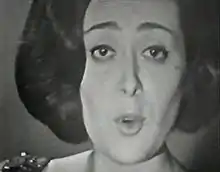 Simone de Oliveira in Naples (1965)
Simone de Oliveira in Naples (1965)
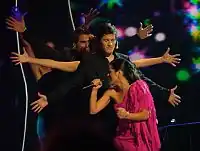 Sofia Vitória in Istanbul (2004)
Sofia Vitória in Istanbul (2004)
 Vânia Fernandes in Belgrade (2008)
Vânia Fernandes in Belgrade (2008)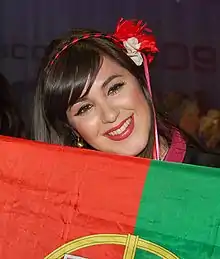 Flor-de-Lis in Moscow (2009)
Flor-de-Lis in Moscow (2009) Filipa Azevedo in Oslo (2010)
Filipa Azevedo in Oslo (2010)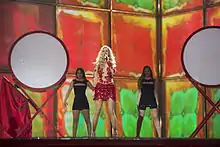
 Leonor Andrade in Vienna (2015)
Leonor Andrade in Vienna (2015).jpg.webp) Salvador Sobral in Kyiv (2017)
Salvador Sobral in Kyiv (2017).jpg.webp) Cláudia Pascoal in Lisbon (2018)
Cláudia Pascoal in Lisbon (2018)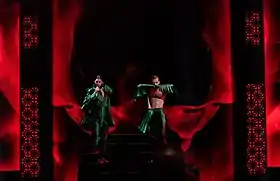 Conan Osíris in Tel Aviv (2019)
Conan Osíris in Tel Aviv (2019)
See also
- Portugal in the Junior Eurovision Song Contest – Junior version of the Eurovision Song Contest.
- Portugal in the Eurovision Dance Contest – Dance version of the Eurovision Song Contest.
- Portugal in the Eurovision Young Dancers – A competition organised by the EBU for younger dancers aged between 16 and 21.
- Portugal in the Eurovision Young Musicians – A competition organised by the EBU for musicians aged 18 years and younger.
Notes
- The Festival da Canção was also held in 1970 and 2000, although Portugal did not participate in either of those years.
- All conductors are Portuguese by nationality unless otherwise noted.
- Host conductor
- During the voting sequence of the live show, several errors were made in the announcement of the scores, which were then adjusted after the broadcast. Both Greece and France duplicated scores, awarding the same points to multiple countries. From the Greek scores, The UK, Netherlands, Austria & Finland all had 1 point deducted after the contest and from the French scores, Austria, Germany, Israel, Italy & Portugal all had 1 point deducted. None of the adjustments affected the placing of any of the songs. The Portuguese score was thus reduced from 20 during the broadcast to 18 after the show.
- During the voting announcement, due to a misunderstanding by the presenter Yardena Arazi, Spain appeared to award 10 points to both Portugal and Israel and these scores were added to the scoreboard. After the programme, verification confirmed that Portugal should only have received six points, leaving the total Portuguese score reduced by four points to 64.
- Conducted by José Marinho at the national final.
- Conducted by Rui Filipe at the national final.
- Also contains phrases in English, French and Spanish.
- If a country had won the previous year, they did not have to compete in the semi-finals the following year.
- The 2020 contest was cancelled due to the COVID-19 pandemic.
- Voted by commentators.
References
- The Eurovision song that made Portuguese history - second Semi-Final - Eurovision 2018, Official Youtube Eurovision Channel, 10.05.2018
- O'Connor, John Kennedy. The Eurovision Song Contest - The Official History. Carlton Books, UK. 2007 ISBN 978-1-84442-994-3
- Bakker, Sietse (29 November 2002). "EBU confirmed: Portugal resigns, Latvia is in". esctoday.com. ESCToday. Archived from the original on 4 March 2016. Retrieved 29 November 2002.
- Jiandani, Sanjay (22 November 2012). "Portugal will not participate in Eurovision 2013". esctoday.com. ESCToday. Archived from the original on 8 June 2013. Retrieved 22 November 2012.
- Jiandani, Sanjay (7 October 2015). "Portugal: RTP will not participate in Eurovision 2016". esctoday.com. ESCToday. Retrieved 7 October 2015.
- Antunes, Rui Pedro (15 May 2017). "Portugal: Preparem o MEO Arena. E 30 milhões. Vem aí a Eurovisão". Observador. Observador. Retrieved 15 May 2017.
- Tukker, Bas. "Search for a Eurovision conductor, by country". Andtheconductoris.eu. Retrieved 18 January 2021.
- Floras, Stella (27 May 2008). "The 2008 Bezençon Awards winners". esctoday.com. Retrieved 8 December 2019.
- "Winners of the Marcel Bezençon Awards 2017". eurovision.tv. 14 May 2017. Retrieved 8 December 2019.
- Adams, William Lee (9 July 2015). "Poll: Who was the worst dressed Barbara Dex Award winner?". Wiwibloggs. Retrieved 8 December 2019.
- van Lith, Nick (26 May 2019). "Conan Osiris wins the Barbara Dex Award 2019". escxtra.com. Retrieved 8 December 2019.
- "Nuno Galopim também será comentador da Eurovisão". Portal dos Programas. 2017-04-14. Archived from the original on 2017-04-21. Retrieved 2017-05-01.
- "Filomena Cautela é a porta-voz de Portugal na Grande Final do Festival Eurovisão 2017". www.escportugal.pt. Archived from the original on 2017-05-04.
- "ESC2019: José Carlos Malato e Nuno Galopim são os comentadores da transmissão da RTP". ESCPortugal (in Portuguese). 4 May 2019. Archived from the original on 4 May 2019. Retrieved 18 November 2019.